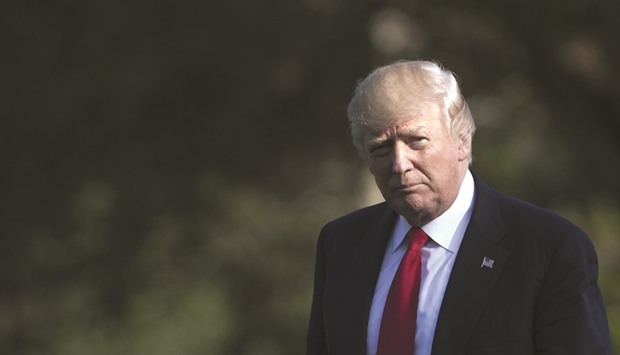US President Donald Trump said yesterday that many of the leaks from the White House were “fake news”, following reports his son-in-law tried to set up a secret channel of communications with Moscow before Trump took office.
Trump returned to the White House after a nine-day trip to the Middle East and Europe that ended on Saturday to face more questions about alleged communications between his son-in-law Jared Kushner and Russia’s ambassador to Washington.
“It is my opinion that many of the leaks coming out of the White House are fabricated lies made up by the #FakeNews media,” Trump wrote in a series of Twitter posts yesterday.
Kushner, who is married to Trump’s daughter Ivanka, had contacts with Moscow in December about opening a secret back channel of communications, according to news reports published while Trump was away on his trip.
Kushner had at least three previously undisclosed contacts with the Russian ambassador to the United States during and after the 2016 presidential campaign, seven current and former US officials told Reuters.
“Whenever you see the words ‘sources say’ in the fake news media, and they don’t mention names...it is very possible that those sources don’t exist but are made up by fake news writers.#FakeNews is the enemy!” Trump wrote.
Trump’s tweets came as the media reported that the White House was preparing to establish a “war room” to combat mounting questions about ties between Russia and his presidential campaign. Contacts between Trump associates and Russian officials during the campaign coincided with what US
intelligence agencies concluded was a Kremlin effort through computer hacking, fake news and propaganda to boost Trump’s chances of winning the White House.
The report, if confirmed, would raise new questions about the Trump team’s relationship with the Russians, who US intelligence agencies say tried to sway the November election in Trump’s favour.
News reports said the White House, reeling from the explosive developments in the long-running Russia saga, is creating a new rapid-fire communications unit to respond to the controversy, led by Kushner, senior presidential adviser Steve Bannon and White House Chief of Staff Reince Priebus.
Though Kushner has appeared “subdued,” he does not plan to step aside as Trump’s senior adviser or reduce his responsibilities, the New York Times reported, citing unnamed people close to him.
After some delay, a senior Trump administration official en route back to Washington briefed reporters for almost 25 minutes, on matters from anti-terror co-operation to the administration’s view that the summit had been a smashing success — despite huge differences on climate change.
Trump plans to make an announcement within the week on his climate position, the official said. But the said official did not address the Kushner reports Saturday.
Trump then returned to Washington Saturday night from his first overseas trip, to the Middle East and Europe. Accompanied by first lady Melania, Trump waved to reporters as he made his way into the White House but made no comment.
National Security Advisor H R McMaster refused to talk about the allegations. But he said that in general: “We have backchannel communication with a number of countries. What that allows you to do is communicate in a discrete manner.”
“I would not be concerned about it,” he added. But a former head of the US National Security Agency harshly condemned Kushner’s alleged effort to set up a secret communications line, saying if it is true, it would reveal a dangerous degree of ignorance or naivete.
“What manner of ignorance, chaos, hubris, suspicion, contempt would you have to have to think that doing this with the Russian ambassador was a good or appropriate idea?” Michael Hayden said on CNN.
He said he leaned toward “naivete” as an explanation, though he did not find it comforting.
Malcolm Nance, a retired naval officer and expert on terrorism and intelligence, said: “This is now sinister. There is no way this can be explained, from the intelligence perspective.”
“That is indicative of espionage activity of an American citizen that is working in league with a hostile government,” he told MSNBC.
The Washington Post said Kushner’s secret communications proposal was made December 1 or 2 at Trump Tower in New York, according to intercepts of Russian communications that were reviewed by US officials.
Michael Flynn, who was Trump’s national security adviser for just 24 days before being fired amid questions about meetings he held with the Russian ambassador, was also present, the newspaper reported.
The Post said the Russian ambassador to the United States, Sergei Kislyak, was surprised by the future White House aide’s idea of a secret channel and passed it on to the Kremlin.
The New York Times said the channel was never established.
Trump returned to Washington to face a cascade of other worries related to the Russia probe in the coming days, including expected testimony by fired former FBI director James Comey before a Senate committee.
Kushner boasts an enormous portfolio of domestic and international responsibilities underscoring his importance as Trump’s chief aide-de-camp, despite having no experience in politics before the 2016 White House race.
He is the only person currently in the White House known to be under investigation. The Post and other media have been careful to note that their sources did not say Kushner was a “target” of the investigation, nor that he was accused of any wrongdoing.
Labeling him a “target” would suggest Kushner was a main suspect of the investigation.
But there have been a number of as yet unexplained contacts — during last year’s presidential campaign against Democrat Hillary Clinton and afterward — between other top Trump aides and senior Russian officials, including Flynn, US Attorney General Jeff Sessions, Manafort and others.

Donald Trump
